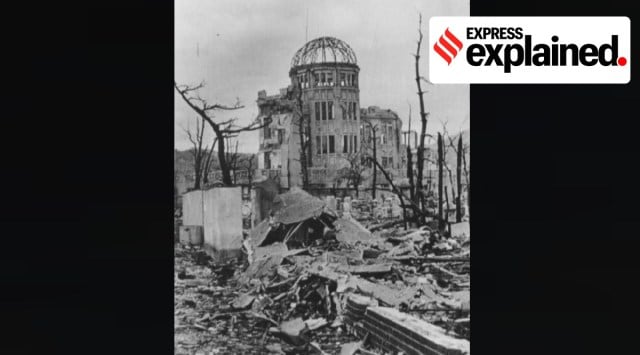August 6, 1945, saw the first-ever use of a nuclear weapon when the United States dropped the ‘Little Boy’ bomb on the city of Hiroshima in Japan.
Though the US went on to drop another bomb on August 9 in the city of Nagasaki, since then no other country has used nuclear weapons on another nation. The US justified its attacks in the name of war and to force Japan’s surrender, but historians have debated its necessity. It has also been suggested that the bombs were used despite an expected surrender from Japan, to showcase American superstrength in the face of possible competition from the USSR in a post-war era.

It can be argued that despite the power commanded by the US and the undeniable Japanese aggression in the lead-up to and during the Second World War, it has been difficult to make a case for actually using the bomb. One strong reason behind it is that as more and more countries have acquired such weapons, a strike is likely to end in an equal, if not greater retaliation, leading to what is termed as ‘mutually assured destruction’.
But another aspect is a strong moral argument against the bomb: that it is simply unjustifiable, no matter the worthiness of the cause. Indeed, after the bomb’s creation, even scientists such as Albert Einstein and Robert Oppenheimer, who played a role in its creation, expressed regret after seeing the real-world devastation it caused.
Many renowned figures across the world condemned the decision at the time, including MK Gandhi, who had long established ahimsa or non-violence as a core principle of his ideology. In using the bomb, he said, humanity as a whole had let go of something essential from a moral perspective.
What Gandhi said about atomic bombs and Japan
Gandhi wrote in 1946 that even against the atomic bomb, he trusted in the ways of truth and non-violence as guiding forces. “The one is infinitely superior to the other which by its very nature has an end. The force of the spirit is ever-progressive and endless.”
He said that it could happen that the bomb’s destructive power would so disgust the world that it would turn away from violence for the time being. But he says that this would open the possibility of a world returning to violence with “renewed zeal after the effect of disgust is worn out”. And so, he said, what drives humanity away from such a scale of violence should not be disgust, but that they should be against it even before it has happened – as a matter of strict principle.
Story continues below this ad
This is when he wrote: “So far as I can see, the atomic bomb has deadened the finest feeling that has sustained mankind for ages. There used to be the so-called laws of war which made it tolerable. Now we know the naked truth. War knows no law except that of might.” He termed this an “empty victory” at the hand of the Allied forces, coming at the cost of “destroying the soul of Japan”. He went on to say that he was not justifying the actions of Japan and its “unworthy ambition”, but that it did not allow for wanton destruction.
“The moral to be legitimately drawn from the supreme tragedy of the bomb is that it will not be destroyed by counter-bomb… Mankind has to get out of violence only through non-violence. Hatred can be overcome only by love, Counter-hatred only increases the surface as well as the depth of hatred… I believe in what Max Muller said years ago, namely, that truth needed to be repeated as long as there were men who disbelieved it.”
Gandhi believed that surely it was not guaranteed that such kind of violence would not happen again. While that has not been the case, it has also not translated into a scenario where wars and the prospect of major destruction are things of the past. The world has often edged close to the threat of n-weapons being used and it has not shunned large-scale violence.
India, in its journey of acquiring nuclear weapons, always stressed the doctrine of No First Use, meaning it would never attack another country unprovoked. However, there was an exception: the doctrine made it clear that India’s “nuclear retaliation to a first strike will be massive and designed to inflict unacceptable damage”. Also, in case of a major biological or chemical weapons attack against India, it has retained the option of retaliating with nuclear weapons.
Story continues below this ad
It can be argued that even though no nuclear weapons have been used in wars anywhere in the world since the US attacks on Japan, the destruction that was first caused by the bomb has created a kind of spectrum, where the worst thing that could possibly have been done has been committed. It has elevated the capacity for violence, meaning anything a shade short of it is, in a way, acceptable.
In that case, Gandhi’s views have relevance, signifying a moral low associated with the event, which may have permanently altered humanity’s tolerance for violence.








































